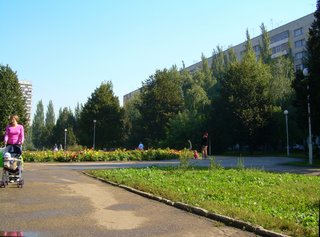
You should see it, the lavish pavilion in front of our new apartment; it’s the pinnacle of Soviet urban planning. In the post-revolution center of the city, it lies in front of an impressive, well known apartment building on Prospect Lenina [see above background right, that's where we live]. Walking through it’s greenery late yesterday morning, I could imagine myself back in the time when it was just designed and built. The air is fresh and sweet and th e warm, angled sunlight makes every living thing look as though it were dancing on the inside. Babi [old women, literally grandmothers] stroll down the pavilion’s verdant, bench-lined walkways, their gold teeth shining in a smile, their granddaughters pulling them forward by the arm as they skip along ahead. Its bright, floral circles and well-kept soccer and basketball courts [see left and below] bring the drab, quarter-mile long, 9-storey apartment building, along which it stretches down to human size. The old men gossiping on benches are shielded fr
e warm, angled sunlight makes every living thing look as though it were dancing on the inside. Babi [old women, literally grandmothers] stroll down the pavilion’s verdant, bench-lined walkways, their gold teeth shining in a smile, their granddaughters pulling them forward by the arm as they skip along ahead. Its bright, floral circles and well-kept soccer and basketball courts [see left and below] bring the drab, quarter-mile long, 9-storey apartment building, along which it stretches down to human size. The old men gossiping on benches are shielded fr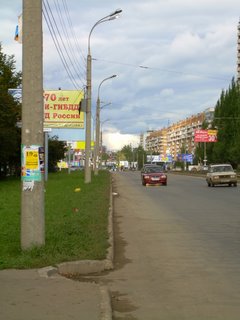 om the bustling traffic of Prospect Lenina [see right] by carefully planted rows of evergreens. Their square, tinted glasses reflect the sun’s overzealous rays.
om the bustling traffic of Prospect Lenina [see right] by carefully planted rows of evergreens. Their square, tinted glasses reflect the sun’s overzealous rays.
This is the socialist paradise we are all working so hard to bring about. Sure, it is only apparatchiki who live alongside this little strip of heaven, but soon we will bring this way of life to all Soviet citizens, to the workers who built it as well as the planners who organized it. We are almost there. You can see it. You can taste it. You can feel its air brushing up against your cheek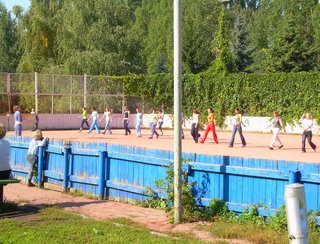
This pavilion is still an idyllic place, but now it is only oil industry businessmen (and foreign researchers on government exchanges) who can afford such luxury. Our apartment is a comfortably large, recently remodeled two-bedroom apartment with a living room, satellite television and, soon, DSL. It is not in the style known as ievroremont [euro-remodel], but has some nice new appliances. (Of course the podezd [entryway and stairwell] is decrepit and smells strongly of urine and the elevator occasionally doesn't work, but that's virually unavoidable in Russia)
This wonderful apartment, for me, comes with a tinge of guilt. We are paying half the money for twice the space we would get in the still gentrifying neighborhoods of Brooklyn. But, our apartment is costlier than that of anyone I know in Samara. Everyone who learns how much we pay think it is an astronomical price (about $700 a month for the whole apartment). But they also could not imagine looking for an apartment in this neighborhood. My friend Olya and her husband who helped us find the place, for example, are starting a family in a slightly smaller apartment, a fourty minute bus ride from the city center (here). Most Russians have difficulty understanding how two kids in their early to mid twenties would be able to afford such an apartment, let alone why they would want to. It is unusual for Russians to spend time living alone between the home of their parents and the home of the family they start. This is the result of both cultural norms and economics. If they do, it is usually time spent in an obshchezhitie [the word meaning dormitory but also youth hostel].
The fact of our luxurious living situation only exacerbates what I have found to be already a difficult dynamic. I wish to represent my country as accurately as possible, explaining both its strengths and its weaknesses, but I do so in a country that has been saturated for the last few decades with Americans singing their own praises, through cold war propaganda campaigns like Voice of America, through foolhardy economic advisors in the chaotic Yeltsin’ years, through the zealous foreign aid or religious missionaries that have been streaming in since, through the wealthy business advisors that now come and spend their conspicuous wealth, and, perhaps most importantly, through imported American cultural products which depict American life, for the most part, in the terms of its own ideological paradise – that of a rich, well functioning, freedom-loving market economy and liberal democracy.
Certainly those living in America do benefit from high quality service provision, relative transparency in both business and government, and some meaningful opportunities to affect the policies of their government, and it is easy to appreciate those things here where socio-economic and political arrangements are still in constant flux. However, many Russians, especially young ones see America as a paradise where all are rich enough to afford the flashy goods and services they see on MTV and in shows like the Sopranos. I am often asked if life in America isn’t ‘better’ than life in Russia. How can one compare entirely different ways of life? Well, the life expectancy is higher (if you don’t live in an urban high poverty area), but the literacy rate is lower… One student was truly surpised when I told him that, indeed, there are poor people in the United States too.
If America ‘won’ the Cold War we now have a cold victory. The warmth and joy that we all saw when the Berlin wall fell has now dispersed.
The Soviet paradise that our pavilion once represented has crumbled. The pavilion remains, but there is no rational scheme in which to fit it: paradise is a place far, far away; toward which one cannot hope to achieve rational progress. Marxism-Leninism provided a plan, a rational schema, which might someday literally extend our paradisiacal pavilion down the extent of Prospect Lenina and, ultimately, through the rest of the city. The current power structure is not built upon any ideology. For better or worse, as the United Russia party entrenches itself into the organs of the government, its only coherent policy platform is to bring (its version of) order where there is chaos (along vaguely nationalist lines). Much like the American left, there is a vacuum of ideology. And, much like those on the American left, the average Russian is left without any coherent, rational strategy toward its goals. For many Russians, the path from here to paradise is not a matter of strategy, but one of geography.
Perhaps my perspective is merely skewed, because I am an American, but I see ample evidence that it is not around me in the reactions to my being an American. The other day, my American roommate and I were  drinking a beer in the square catty-corner to our apartment building [see right], chatting about our experiences here, our hopes, our fears, etc. There were groups of teenagers all around us drinking beer and enjoying the ever-so-slightly-cool sunset of what is turning out to be a babi leto [Indian summer, literally grandma’s summer]. There was group no more than ten feet away from us that at one point clearly noticed that we were speaking English, but did not approach us to talk. The dusk turned into twilight and the twilight turned into night [see below]. As the teenagers passed by us on their way out of the square, one of them said, not directly to us, but in clear, hesitant English, “Russia.. is the.. best in.. the world!” I stammered out, “Ya.. soglasen” [I agree].
drinking a beer in the square catty-corner to our apartment building [see right], chatting about our experiences here, our hopes, our fears, etc. There were groups of teenagers all around us drinking beer and enjoying the ever-so-slightly-cool sunset of what is turning out to be a babi leto [Indian summer, literally grandma’s summer]. There was group no more than ten feet away from us that at one point clearly noticed that we were speaking English, but did not approach us to talk. The dusk turned into twilight and the twilight turned into night [see below]. As the teenagers passed by us on their way out of the square, one of them said, not directly to us, but in clear, hesitant English, “Russia.. is the.. best in.. the world!” I stammered out, “Ya.. soglasen” [I agree].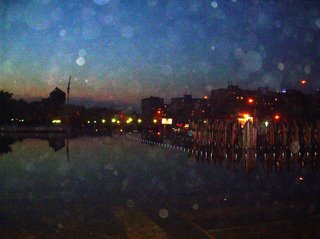
It is becoming increasingly difficult, as my time here slowly fades from tourism into a life, to hold such reactions in their rational context, and not to be simultaneously saddened and annoyed. I could not imagine being so unwelcoming to guests in my country. I would hold my friends to an equal ethical standard. Is it condescending of me to not take offense by such antagonism? Or would it just be callous of me to take such a comment out of its broader geopolitical context, and then go home to my fancy new apartment to leisurely work on my prestigious, self-structured and self-glorifying research project?
I’m not sure, but I’m sure glad I can.
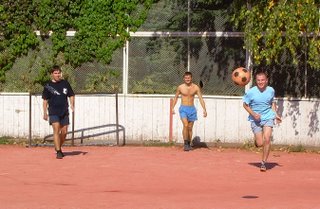

0 Comments:
Post a Comment
<< Home